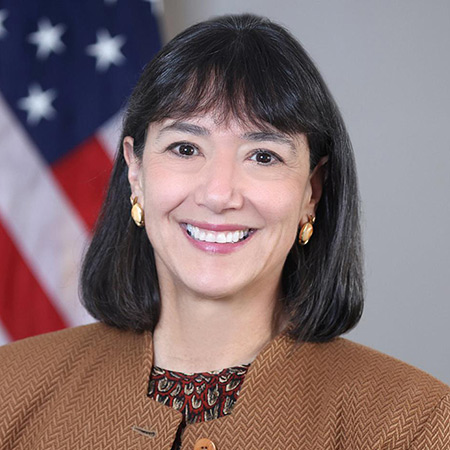Leadership

Monica M. Bertagnolli, M.D.
NIH Director

Janine Austin Clayton, M.D., FARVO
Director, Office of Research on Women's Health
About Women in Biomedical Careers
The Women in Science website is one of the many achievements of the NIH Working Group on Women in Biomedical Careers (WgWBC) whose goal is to consider barriers for women in science and develop innovative strategies to promote the entry, recruitment, retention, and sustained advancement of women in biomedical and research careers. Celebrating the successes of women in science can serve as an inspiration to both women and men. The women’s profiles that are featured on this website highlight their contributions to research, what they learned along the way, and advice they have for other women in science. You will also find information, tools, and resources that support and promote the entry, recruitment, retention, and sustained advancement of women in biomedical research careers.
The WgWBC is an NIH-wide effort created in 2007 in response to a National Academies report, Beyond Bias and Barriers: Fulfilling the Potential of Women in Academic Science and Engineering. The WgWBC is co-chaired by Monica M. Bertagnolli, M.D., the NIH Director, and the ORWH Director, Janine Austin Clayton, M.D, FARVO. This working group comprises senior staff from across NIH, including NIH deputy directors, staff from the Office of the Director (OD), Institute and Center (IC) directors, scientific directors, and other representatives of the intramural and extramural research communities.
The WgWBC has sponsored national workshops, such as the Causal Factors and Interventions Workshop, Women in Biomedical Research: Best Practices for Sustaining Career Success, and the National Leadership Workshop on Mentoring Women in Biomedical Careers and other programs.
Its mandate is:
- To maximize the potential of women scientists and engineers
- To consider how programs and policies it has created give attention to the NIH intramural communities and the concerns of intramural women
- To consider the broader context of girls and women in science
- To provide special attention to issues of barriers, minority women scientists, and mentoring
Achievements of the NIH Working Group on Women in Biomedical Careers
- NIH Support for the Careers of Women in Biomedical and Behavioral Science and Engineering. NIH funded 14 grants investigating causal factors and interventions affecting the careers of women in biomedical and behavioral sciences and engineering
- Paid parent leave extension for NIH intramural trainees to eight weeks
- Tenure-clock modification for NIH intramural scientists that automatically incorporates an additional year to accommodate family leave
- A program for short-term backup care for children, elders, and adult dependents of NIH employees
- The "Keep the Thread" program: an accommodation program for intramural postdoctoral fellows that offers flexible schedule options and part-time work options
- A leave bank program that provides additional paid leave so NIH employees can attend to family responsibilities
- NIH family-friendly policies and resources summaries for the extramural community
- NIH Support for Conferences and Scientific Meetings update to require that applicants "Describe plans to identify resources for child care and other types of family care at the conference site to allow individuals with family care responsibilities to attend"
- Biosketch section modification to NIH grant applications to allow applicants to "briefly describe factors such as family care responsibilities, illness, disability, and active duty military service that may have affected your scientific advancement or productivity"
- Establishment of the Women of Color Research Network (WOCRN)
- Nominated women and women of color for awards and prestigious presentations
Guiding Frameworks
The Working Group is currently considering next steps in the context of several seminal reports including the following to develop strategies to accelerate progress toward the NIH Vision of a world where all women in STEM reach their full potential.
- 2018: NIH Advisory Committee to the Director (ACD) Working Group on Changing the Culture to End Sexual Harassment, a high-level working group of the Advisory Committee, was developed in response to a recent National Academies report to address sexual harassment in scientific settings at NIH, review the plans on managing reports of harassment, and recommend further actions.
- 2020: Promising Practices for Addressing the Underrepresentation of Women in Science, Engineering, and Medicine, which made actionable recommendations to improve the representation and leadership of women in STEMM,
- 2021: Investigating the Potential Impact of COVID-19 on the Careers of Women in STEMM, which provides questions aimed at understanding the impacts of the disruptions from the COVID-19 pandemic, and at exploring opportunities to help support the full participation of women in the future.
Committees
Women of Color Committee (WOCC)
Under the leadership of Dr. Rena D’Souza (NIDCR), Dr. Reiko Toyama (NICHD), Dr. Mia Rochelle Lowden (NINR), Ms. Rosalina Bray (OD), and , and Dr. Precilla Belin (NCI), the WOCC is charged with addressing the unique challenges facing women scientists of color as they enter and advance their careers. To promote visibility and recognition of women scientists of color, the WOCC has successfully nominated over a dozen exceptional women researchers for the prestigious NIH Director’s Wednesday Afternoon Lecture Series (WALS). The WOCC created the Women of Color Research Network (WoCRN) to provide support and information about the NIH grants process, advice on career development, and a venue for networking and sharing information. The WOCRN LinkedIn group has over 1,300 members. In addition, in 2022, the WOCC launched a forum within NIH to discuss “Navigating the Path to Success for Women Scientists.”
Partnerships Committee
The Partnership Committee, chaired by Dr. Holly Moore (NIDA), hosted a successful summit on Reimagining Women in the Bioengineering, Technology, and Data Science Ecosystem: A Partnership-Building Initiative, held in May of 2022. Follow-up activities include disseminating an executive summary of the Summit to stakeholders/recipients and conducting a survey of the partnership landscape. Further, the Partnership Committee plans to:
- Hold a public workshop focused on the takeaways from the Summit,
- Design, create and/or promote cross-sector initiatives to promote career advancement/mobility for women and people from underrepresented communities (e.g., externship concept with the Foundation for the National Institutes of Health (FNIH), and
- Start on the design of a connector system/tool for cross-sector workforce development programs.
Intramural Program Committee
To support a diverse scientific workforce and provide clear opportunities for career development, the Intramural Program Committee, chaired by Dr. Nina Schor (OD), proposes to broaden recruitment, better communicate the resources available at NIH, and develop a more supportive environment for early- and mid-career scientists in the NIH intramural community, including Investigators (tenure track), Assistant Clinical Investigators (ACI), Independent Research Scholars (IRS), and Staff Scientists and Staff Clinicians.
Extramural Program Committee
Led by Dr. Ericka Boone (OER), the Extramural Program Committee was formed to identify promising practices for addressing the underrepresentation of women in science, technology, engineering and medicine (STEM). The committee hopes to advance women in STEM through initiatives and programs that address barriers to advancement as well as empower women. To support these efforts, the committee is conducting analyses and developing initiatives to address and prevent harassment, hostility, and/or discrimination in the workplace in consultation with the Civil Program and EDI. In addition, the committee will recommend grant mechanisms to facilitate the continuous training and career mobility of women in STEM. Finally, the committee will work with the Director of the Biomedical Research Workforce Division on a landscape analysis. This will inform the development of future initiatives to support research on institutional causal factors and interventions to promote the advancement of women scientists. This committee also supports the development of programs that promote research continuity and retention in academia. These programs include career grant extensions due to pandemic impact, caregiving and childcare support programs, and departures due to critical life events and pay equity.
“Through the Working Group’s efforts, the NIH is striving to determine solutions that will shrink and eventually close the gender gap in sciences and engineering. ... That is why this publication, Women in Science at the National Institutes of Health, 2007–2008, which highlights successful women at the NIH, can serve as an inspiration to both women and men.”
Page last updated on
